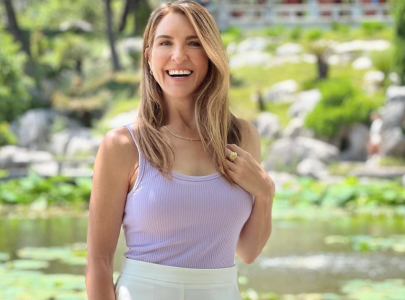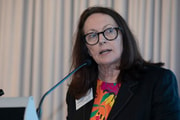Invisible illness plagues Channel 7 star: 'I just feel terrible'
By
VanessaC
- Replies 6
Melanie Symons, the effervescent host of Channel 7’s Sydney Weekender, has been a familiar face on Australian television for over three decades.
However, behind her radiant smile and vivacious personality, Melanie has been courageously battling an invisible illness since she was just 12 years old.
Diagnosed with scoliosis, a condition that causes the spine to curve sideways, Melanie has spent her life managing the physical and emotional challenges that come with this condition.
The diagnosis came after a routine school test in 1978, where she was asked to bend down and touch her toes.
The examiner noticed that her shoulder blades were misaligned, prompting a visit to a specialist.
The X-ray results were startling.
'You can visually see very clearly how my spine was an S-curve,' Melanie, now 48, shared.
One specialist even warned her that she 'would be hunched over by the time I was 40'.
This grim prognosis was a terrifying prospect for a young girl, who was suddenly faced with a future marred by scoliosis.
Melanie was presented with two treatment options: invasive surgery or a back brace.
Choosing the less invasive route, Melanie and her family opted for the back brace.
This decision, however, came with its own set of challenges.
The brace, equipped with steel bars, extended from under her chin to her hips, exerting significant pressure on her lower back and stomach.
'For a child who’s not used to going through anything like that, it was pretty challenging,’ she recalled.
'I had to wear the back brace for most of my high school years, and initially it’s 23 hours a day, so you only get one hour out of it.'
For a time, the brace was her nighttime companion, too.
'I vividly remember [it] being really uncomfortable and upsetting because it’s got steel bars.'
The discomfort was exacerbated by the Queensland heat, making the experience even more gruelling.
The physical discomfort was only part of the struggle. The brace also took a toll on Melanie's self-esteem during her formative teenage years.
'Not being able to wear clothes that other teenagers were wearing, catching the bus to school and seeing boys on the bus and feeling very self-conscious,' she shared.
'(It was) really uncomfortable for a very, very long time.'
Despite the challenges, Melanie found solace in the support of a fellow student battling scoliosis.
'I wasn’t picked on and felt like I had a partner in it. But I remember feeling not very attractive to boys I liked.'
Today, Melanie continues to grapple with the effects of scoliosis. Without proper management, the pain intensifies.
'I can’t concentrate, I get headaches, and I just feel terrible,' she said.
However, she has found solace in a variety of strategies, including swimming, pilates, yoga, and a surprising lifestyle change—giving up alcohol.
'I cannot tell you how much my pain has lessened from striking alcohol out altogether,' she said.
Alcohol, she explained, causes inflammation in her body, leading to increased back pain.
Motherhood presented its own set of challenges.
Melanie recalls her pregnancy as a challenging time due to her scoliosis.
'I had a lot of trouble during my pregnancy, it makes the position of your spine more painful,' she recalled.
Even simple tasks like reading a bedtime story to her seven-year-old daughter, Alexandra, can be challenging due to the discomfort of sitting up in bed after a long day.
Despite the hurdles, Melanie has managed to carve out a successful career in television, landing her first TV gig just three years after her diagnosis.
She has since become a beloved figure on Australian screens, working with Saturday Disney, Totally Wild, and Sydney Weekender.
Melanie is also passionate about raising awareness about scoliosis and encouraging young sufferers to understand that the condition can be managed.
'There can be a lot of light at the end of that tunnel,' she claimed.
 Members, what are your thoughts on Melanie’s story? Let us know in the comments below!
Members, what are your thoughts on Melanie’s story? Let us know in the comments below!
However, behind her radiant smile and vivacious personality, Melanie has been courageously battling an invisible illness since she was just 12 years old.
Diagnosed with scoliosis, a condition that causes the spine to curve sideways, Melanie has spent her life managing the physical and emotional challenges that come with this condition.
The diagnosis came after a routine school test in 1978, where she was asked to bend down and touch her toes.
The examiner noticed that her shoulder blades were misaligned, prompting a visit to a specialist.
The X-ray results were startling.
'You can visually see very clearly how my spine was an S-curve,' Melanie, now 48, shared.
One specialist even warned her that she 'would be hunched over by the time I was 40'.
This grim prognosis was a terrifying prospect for a young girl, who was suddenly faced with a future marred by scoliosis.
Melanie was presented with two treatment options: invasive surgery or a back brace.
Choosing the less invasive route, Melanie and her family opted for the back brace.
This decision, however, came with its own set of challenges.
The brace, equipped with steel bars, extended from under her chin to her hips, exerting significant pressure on her lower back and stomach.
'For a child who’s not used to going through anything like that, it was pretty challenging,’ she recalled.
'I had to wear the back brace for most of my high school years, and initially it’s 23 hours a day, so you only get one hour out of it.'
For a time, the brace was her nighttime companion, too.
'I vividly remember [it] being really uncomfortable and upsetting because it’s got steel bars.'
The discomfort was exacerbated by the Queensland heat, making the experience even more gruelling.
The physical discomfort was only part of the struggle. The brace also took a toll on Melanie's self-esteem during her formative teenage years.
'Not being able to wear clothes that other teenagers were wearing, catching the bus to school and seeing boys on the bus and feeling very self-conscious,' she shared.
'(It was) really uncomfortable for a very, very long time.'
Despite the challenges, Melanie found solace in the support of a fellow student battling scoliosis.
'I wasn’t picked on and felt like I had a partner in it. But I remember feeling not very attractive to boys I liked.'
Today, Melanie continues to grapple with the effects of scoliosis. Without proper management, the pain intensifies.
'I can’t concentrate, I get headaches, and I just feel terrible,' she said.
However, she has found solace in a variety of strategies, including swimming, pilates, yoga, and a surprising lifestyle change—giving up alcohol.
'I cannot tell you how much my pain has lessened from striking alcohol out altogether,' she said.
Alcohol, she explained, causes inflammation in her body, leading to increased back pain.
Motherhood presented its own set of challenges.
Melanie recalls her pregnancy as a challenging time due to her scoliosis.
'I had a lot of trouble during my pregnancy, it makes the position of your spine more painful,' she recalled.
Even simple tasks like reading a bedtime story to her seven-year-old daughter, Alexandra, can be challenging due to the discomfort of sitting up in bed after a long day.
Despite the hurdles, Melanie has managed to carve out a successful career in television, landing her first TV gig just three years after her diagnosis.
She has since become a beloved figure on Australian screens, working with Saturday Disney, Totally Wild, and Sydney Weekender.
Melanie is also passionate about raising awareness about scoliosis and encouraging young sufferers to understand that the condition can be managed.
'There can be a lot of light at the end of that tunnel,' she claimed.
Key Takeaways
- Channel 7's Melanie Symons has been living with scoliosis since she was diagnosed at the age of 12.
- Despite being told she would be 'hunched over by 40,' Melanie chose to manage her scoliosis with a back brace during her teenage years, avoiding invasive surgery.
- Melanie has developed strategies to cope with the pain caused by scoliosis, including swimming, the right kind of pilates, yoga, and abstaining from alcohol, which she found exacerbated her symptoms.
- Melanie Symons, now a television host and mother, encouraged other young scoliosis sufferers that the condition can be managed, and it won't stop them from achieving their dreams.








